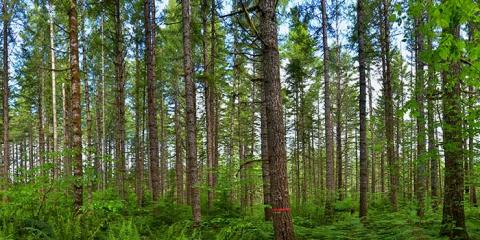Managing Forest Ecosystems with Eric Vines
July 14, 2015
Forest ecosystems are remarkably complex. The multitudinous interactions of soils, water, plants, animals, insects, fish, birds, amphibians, fungi and microorganisms with wind, fire, drought, ice storms, the passage of time and, not least, the impact of people...all weave complex melodies. Like trying to simultaneously watch a dozen operas, each with its dramatic themes of life and death playing out in real time, these interactions present to us a composition that feels overwhelming.
Of course it's tempting to try and simplify, to hope that if we could just stop cutting down trees (or just cut fewer trees, or just cut different trees) then our forests could be saved. But in the context of complex systems that include a worldwide economy, reductionist thinking gives us results opposite of what we intend. What at first appears to be a simple solution only generates a cascade of competing problems affecting biodiversity, climate and social justice.
Let's explore for a moment the idea that we should decrease tree harvests in a specific region. If demand for wood is constant, reduced cutting in one locale inevitably calls for cutting more heavily somewhere else, often in places where environmental protections are less robust. Alternatively, if we focus our efforts on reducing the use of lumber products overall as a way to drive down demand for trees, then on a planet with an increasing population (and thus increasing demand for housing) we must rely more heavily on other building materials such as concrete, steel, and plastic, none of which are particularly kind to our planet, exacerbating global warming. In addition, a decreased demand for wood would diminish the motive of landowners to maintain their forestlands as forests. Economic pressure would increase their interest in converting their woodlands to something else more productive, like cattle pastures or palm oil plantations. Approaches that call for higher harvest rates or more intensive rotations also have unintended consequences that ripple throughout the global economic system.
Humans now control the destiny of forests on this planet, determining whether there are more or fewer. So we need to be smarter about how we use wood and how we manage our forests, replanting extensively, thinning effectively and facilitating tree diversity and forest resilience. We need to enhance the sequestering of carbon, putting wood to use in structures that can last hundreds of years. We need to shift our economic thinking about the role of forests to a macro-scale. Global trade affects the price we put on any given tree, but it doesn't always reflect its broader value. Our challenge today is to begin accurately valuing forests for their full range of benefits and to use markets to ensure that these values get returned to those people tasked with stewarding these lands.
Faced with an uncertain future, we can no longer afford to regard forest management as anything less than profoundly important and highly complex, wrestling with the multilayered issues for the betterment of our planet today as well as 100 years from today. We need to turn our ecological and economic dilemmas into a respectful celebration of our capacity to hear the calls of competing interests and make rational choices for broad social benefit. We need to give future generations something to sing about. It's hard work. It's complex work. It's our work. Thank you for being part of it.
Eric Vines
Executive Director of the World Forestry Center
